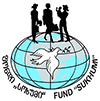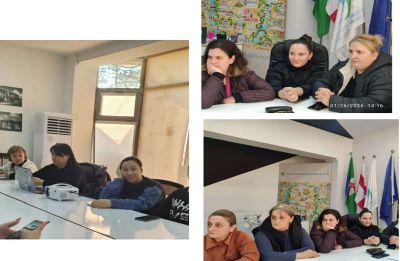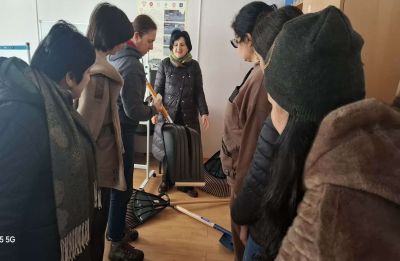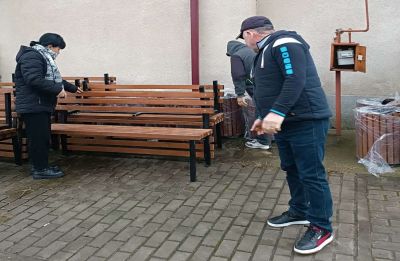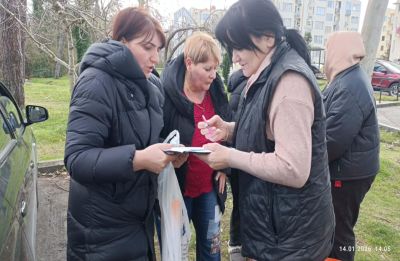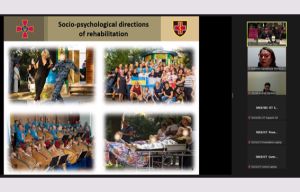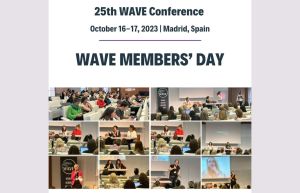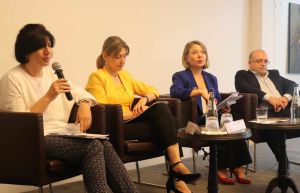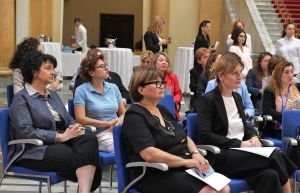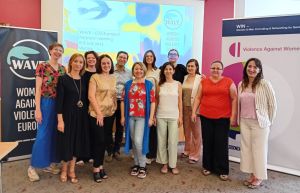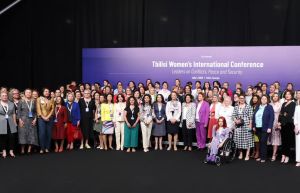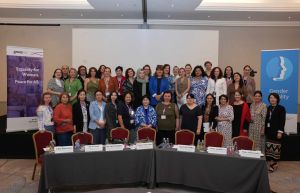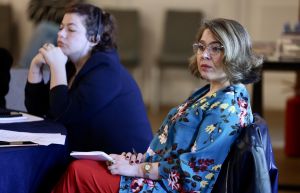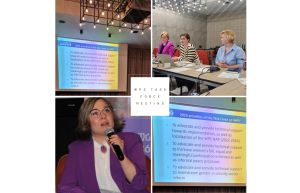Ekaterine Gamakharia, the head of Women Fund “Sukhumi” Tbilisi Office was privileged to represent Women Fund Sukhumi and civil society organizations as a panelist at a remarkable side event organized by Canada, Chair of the Forum for Security Co-operation, and Ireland, Chair of the Human Dimension Committee. The event was dedicated to the crucial topic of „It's about people': Mental health impacts of war on civilians and military personnel.“
Among panelists were Mr. Oleksandr Klen, Clinical Psychologist at the Armed Forces of Ukraine, Dr. Julijana Stojanova, Deputy Head of the Human Resources Department, Ministry of Defence of the Republic of North Macedonia, Mr. Andrew Gardner, Deputy Head of Human Rights Departments, ODIHR, and Major-General March Bilodeau, Surgeon General in the Canadian Armed Forces.
Ekaterine Gamakharia, the head of the Tbilisi representative office of "Women's Fund Sukhumi," participated in the 25th international conference organized by the WAVE network in Madrid. The conference focused on the topic of "Institutional violence and its impact on women's rights in Europe." Approximately 200 women's rights defenders from various European countries discussed institutional violence against women, female migrants, and disabled individuals who have experienced abuse at the hands of state structures.
During the conference, Ekaterine Gamakharia took part in a parallel panel discussion with representatives from the OSCE (Organization for Security and Co-operation in Europe) and non-governmental organizations that are partners of the WAVE network. These organizations, including the Center "Women's Perspectives" in Lviv, Ukraine; the Sexual Assault Crisis Center in Yerevan, Armenia; and the "United Women of Banja Luka" Foundation in Bosnia & Herzegovina, provided insights into the project. Gamakharia had the opportunity to share information about the toolkit titled "Prevention and response to gender-based violence in the war and post-war period: Experience and recommendations of women's non-governmental organizations." The toolkit describes the experiences and best practices of women's organizations in Ukraine, Armenia, Georgia, and Bosnia-Herzegovina in preventing and responding to violence against conflict-affected women in war, protracted conflict, and post-conflict settings. The toolkit can be accessed here
The event, titled "Extended Advocacy Meeting to Address the Urgent Needs of IDPs and Conflict-affected Women and Youth," was held at Tbilisi Rooms Hotel. It was organized by UN Women Georgia and civil society partner organizations, including the Association of Internally Displaced Women "Consent," Women's Information Center, and Women's Fund "Sukhumi."
Representatives from national and local government, as well as the Public Defender, took part in the event. This included attendees from the National Association of Local Self-Governments of Georgia, local authorities from target municipalities. Additionally, international organizations, donor organizations operating in Georgia, international non-governmental organizations focusing on the agenda of women, peace, and security, the private sector - companies that have endorsed the principles of women's empowerment, local women's organizations, and community leaders among internally displaced and conflict-affected women, were present at the meeting.
The meeting centered around the key activities outlined in the National Action Plan and the well-being of internally displaced and conflict-affected women and youth residing along the dividing line and in IDP settlements.
The Gender Equality Council (GEC) introduced the presentation of the Report on “Implementation of the Women, Peace and Security Agenda in Georgia”, introduced by Council member, Teona Akubardia. The presentation was held on September 27 symbolically – the Sokhumi massacre day. The participants observed a minute of silence in commemoration of the victims of the war.
The presentation was attended by MPs, executive authorities, as well as the diplomatic corps, international organizations and civil society. The report has been developed within the UN Women project “Accelerating Implementation of Women, Peace and Security Agenda in Georgia”, funded by CSSF.
On July 6-8, representatives of the Women's Fund "Sukhumi," Ekaterine Gamakharia and Tea Thorinava, embarked on a working visit to Vienna. The purpose of the visit was to participate in a workshop centered around the practical guide developed by partner organizations in 2022, titled "Preventing and responding to gender-based violence during war and in post-war settings: Experiences and recommendations of women's NGOs." The toolkit can be accessed here https://wave-network.org/wp-content/uploads/Toolkit-Georgian.pdf?fbclid=IwAR1rCpxvDqw8HCIz-iBwYSlKCsF9ITicwIkEr-DVCBOI3ZP5eYZv_ATu3IA . The workshop aimed to plan the development process of a training module that would contribute to enhancing the knowledge of individuals interested in the best practices and strategies for preventing and responding to gender-based violence in conflict situations, as outlined in the guide, and their practical implementation.
The workshop involved representatives from the OSCE (Organization for Security and Co-operation in Europe), the WAVE network, and partner non-governmental organizations: the Sexual Assault Crisis Center in Yerevan, Armenia, the Women's Fund "Sukhumi" in Kutaisi and Tbilisi, Georgia, and the "United Women of Banja Luka" Foundation in Bosnia and Herzegovina.
On July 1, at the initiative of the President of Georgia, the Tbilisi International Women's Conference (TWIC) was held. The conference was opened by the President of Georgia and women leaders from different countries of the world are attending it.
Within the framework of the conference, the conversation touched on such issues as conflicts, peace, security and European integration of Georgia. Ekaterine Gamakharia, the head of Tbilisi representative office of the Women Fund "Sukhumi", was invited to the meeting.
On June 26-27, 2023, Ekaterine Gamakharia, the representative of the Women's Fund "Sukhumi," participated in a regional conference organized by the Global Network of Women Peace Builders (GNWP) and supported by the OSCE. Elene Rusetskaya, the head of the Women's Information Center, and Yulia Kharashvili, the head of the Displaced Women's Association "Consent," also attended the conference from Georgia.
The conference brought together women mediators and peace builders from the South Caucasus, Eastern Europe, and Central Asia. The primary objective of the regional conference was to develop a roadmap for civil society networking and advocacy in the field of peace building.
During the conference, the participants actively shared the progress of the implementation of the "Women, Peace and Security" agenda in their respective countries. They discussed existing experiences, challenges, and best practices related to participation in the peace-building and decision-making processes.
How can a society torn apart by war and conflict overcome alienation, rebuild relationships and create a dignified and secure future? - Our representative, Ekaterine Gamakharia, spoke about these issues as a guest on Mamuka Kufaradze's TV program before presenting the Abkhaz film "Waiting for the Future".
Ekaterine Gamakharia, the representative of the Women's Fund "Sukhumi" Tbilisi office, participated in the two-day seminar held during the Council of Europe Visibility Week on April 27-28, within the framework of the cooperation of the Council of Europe Congress and the National Association of Local Authorities of Georgia. The seminar was held within the framework of the "Strengthening Participatory Democracy and Human Rights at the Local Level in Georgia" project, the main topic of which was the strengthening of inclusive communication.
One of the workshop sessions was dedicated to the participants of the local authorities using the "Living Library" method to get to know the personal stories of various vulnerable groups, the challenges they face, and their visions of solving the problems.
Ekaterine Gamakharia, the representative of the Women's Fund "Sukhumi", presented the challenges of the displaced woman to the representatives of the municipality, and spoke about the need for the participation of the displaced people, including women and girls, in the process of developing local policies, and the need to introduce municipal services and social programs to solve the problems they face.
Екатерине Гамахария, руководитель Тбилисского представительства Женского фонда «Сухуми», приняла участие в рабочей встрече гендерной тематической группы - женщины, мир и безопасность. Заседание проходило под председательством Тамар Лобджанидзе, аналитика программы «ООН-женщины» в Грузии и Регины Егоровой-Аскеровой, старшего офицера программы Kvinna till Kvinna на Южном Кавказе.
Представитель Тбилисского офиса Женского фонда «Сухуми» обратила внимание на проблемы передвижения населения, разделенного конфликтом с обеих сторон, ограничения, введенные на перевозки грузов для населения на линии раздела, а также на необходимость повышения информированности, навыков и компетенций в плане конфликто-сенситивных принципов для представителей госинститутов, в том числе представителей сектора безопасности, включенных в процесс восстановления доверия.
